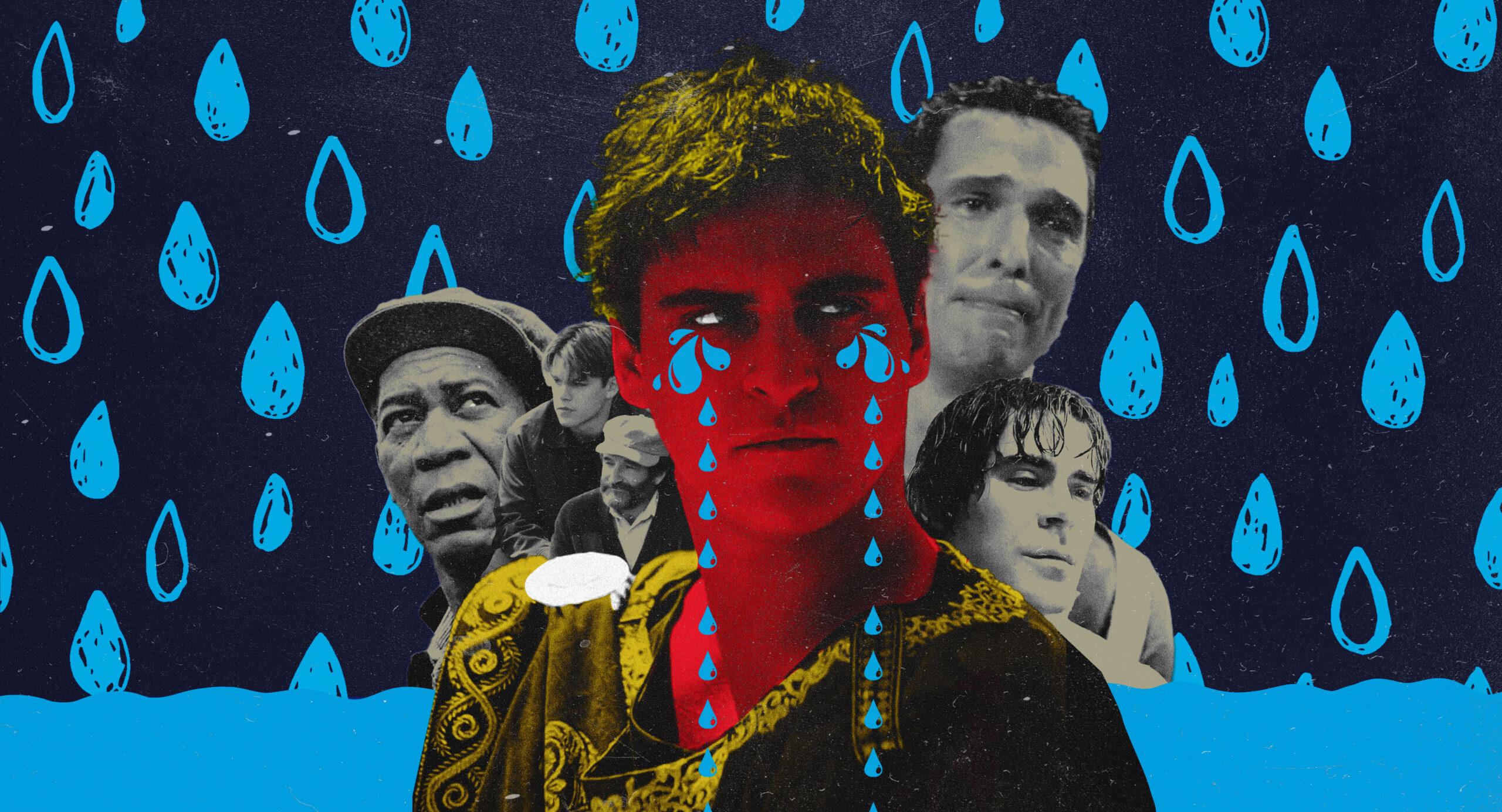Introducing the Guy Cry Movie Canon
To celebrate the release of ‘Gladiator II,’ we’re looking back on the original film—and a host of other movies that regularly reduce grown men to tearsFor the subset of moviegoers who like blockbusters made for adults, it’s slim pickings this winter. No shade to anyone looking forward to Moana 2, Wicked, Sonic the Hedgehog 3, or Mufasa: The Lion King, but I fear that the major studios are making fewer and fewer movies that cater to my interests—in other words, tentpoles that would convince your dad to make a trip to the multiplex. (Where have you gone, Dad Cinema auteurs? Our nation turns its lonely eyes to you.) Thankfully, there’s one blockbuster coming out over the holidays that’s an oasis amid a desert of big-budget mediocrity. Gladiator II is upon us.
Sure, Gladiator isn’t the kind of movie that needed the sequel treatment, but it’s a Best Picture winner helmed by Ridley Scott, a filmmaker who’s still cranking out bangers in his 80s. (A friendly reminder that The Last Duel is a masterpiece.) Based on the trailer, there are minor quibbles to be had with Gladiator II: Maybe the Colosseum wasn’t really filled with sharks, and maybe Denzel Washington doesn’t sound anywhere close to a man who lived in ancient Rome. Well, rebuttal: Fuck history, making gladiators fight sharks is awesome, and Denzel Washington can do whatever the hell he wants—he’s Denzel Washington! I’ve never been more locked in. I need Gladiator II to deliver because, when it comes to my cinematic taste, it’s the only game in town.
Of course, the sequel’s release is also a great excuse to revisit the original film, and you’re not going to believe this, but it still holds up. Joaquin Phoenix? Never been more punchable (yes, including in Joker). The score? I believe it awaits you at the gates of Elysium. Was I not entertained? No doubt! And no matter how many times I watch Gladiator, it will always bring a tear to my eye when Russell Crowe’s Maximus succumbs to his wounds before reuniting with his family in the afterlife. Which got me thinking: Gladiator is quintessential Dad Cinema, yes, but it’s also part of a more niche category that I’ll call the Guy Cry Movie. Allow me to explain.
There are certain films—Titanic, The Notebook, and Marley & Me, to name a few—that will move anyone with a beating heart. The Guy Cry Movie is a slightly different beast. These are films that touch on certain masculine-coded topics or themes—sports, war, father-son relationships—and are so emotionally affecting in their execution that the dudes in your life will need to reach for a box of tissues. Gladiator is a first-ballot Guy Cry Movie, but it’s hardly the only one of its kind. That’s why, to celebrate Gladiator II’s release, we’re putting together the Guy Cry Movie Canon.
Before we get to the nominees, here are some ground rules. There weren’t strict criteria in place for this exercise—taste is subjective, and there won’t be a single movie on this list that will have a 100 percent success rate in making people cry. (I’m sure there are folks out there who weren’t moved by the end of Gladiator; I can’t relate, but I don’t hate.) Additionally, there are layers to the Guy Cry Canon: Some films might make you shed a single tear, while others could reduce you to a sobbing mess. Because of this, each movie will be measured with a highly scientific Guy Cry Meter. Basically, we’re trying to cast a wide net and celebrate films with a macho sensibility that stir up some emotions. With all that in mind, let’s dive in.
Furious 7
After Paul Walker died in a car crash, Furious 7’s production was suspended indefinitely, and the script was reworked to account for the loss of one of the movie’s stars. When it came time to release the film, I’m sure many fans were wondering how such an unapologetically goofy franchise would—or whether it could—address Walker’s death gracefully. But Furious 7 didn’t just deliver a touching send-off for Walker: It did so with the franchise’s reliable brand of corny sincerity. As our heroes hang out at a beach after saving the day (again), they talk about how Walker’s character, Brian O’Conner, is leaving the team to raise his family, but the subtext couldn’t be more clear: The actors, and the audience, are bidding farewell to Walker. (“Things are gonna be different now,” Tyrese Gibson’s Roman says with an uncharacteristic gravitas.) By the time Brian and Dominic Toretto (Vin Diesel) drive off into the sunset—accompanied by a montage of Walker’s scenes throughout the series—Furious 7 had achieved the unthinkable: It transformed a movie that began with cars skydiving and leaping between skyscrapers into a genuine tearjerker. We’ll tell you all about it when we see you again, Paul.
The Guy Cry Meter: A single tear for casuals; full-on sobbing for anyone who feels like they’re part of the Fast family.
Armageddon
I’ve never been a Michael Bay fan, but even his biggest acolytes would concede that he’s not exactly known as a sentimental filmmaker. Armageddon, however, is a notable exception. The story concerns deep-core oil drillers enlisted by NASA to stop an asteroid from wiping out humanity. NASA’s plan? To send a bunch of these dudes into space to drill a huge hole in a moving asteroid and blow it up from the inside. The “science” is complete nonsense, and the premise is so silly that costar Ben Affleck infamously (albeit playfully) roasted it in the DVD commentary. But in spite of its cheesiness—or perhaps because of it—Armageddon takes you on an emotional roller coaster. At the end of the movie, the surviving drillers must draw straws to determine who’ll stay behind and detonate the bomb. Affleck’s AJ is the unlucky soul, but his boss and father figure, Harry (Bruce Willis), disconnects his air hose and throws AJ back into the air lock. Harry’s sacrifice hits the kinds of emotional beats you can see coming from a mile away, but Willis, Affleck, and Liv Tyler—playing Harry’s daughter, Grace, who, naturally, is also in love with AJ—are at the top of their game. Besides, who am I to judge a blockbuster that had a Criterion release?
The Guy Cry Meter: You’ll barely manage to hold back tears if Aerosmith’s “I Don’t Want to Miss a Thing” plays at a bar.
Interstellar
Whether justified or not, there have been times when Christopher Nolan has been criticized as a cold, detached filmmaker—technically gifted but incapable of stirring up heavy emotions. But then there’s Interstellar. The heart of this sci-fi epic is the relationship between NASA pilot Cooper (Matthew McConaughey) and his daughter, Murph (played by a combination of Mackenzie Foy, Jessica Chastain, and Ellen Burstyn), as he travels through a wormhole in search of a new home for mankind. Interstellar’s emotional power rests on when—or whether—Cooper will return and the unapologetically earnest belief that love is capable of transcending space and time. The corny sentiment of Interstellar might not be everyone’s cup of tea, but all the major scenes between Cooper and Murph—him leaving the planet when she’s a child, discovering through a series of videos that she’s aged decades, reuniting at the end of her life—left me in a puddle of tears. Real ones know this is Nolan’s best movie.
The Guy Cry Meter: A live look at me watching Interstellar:
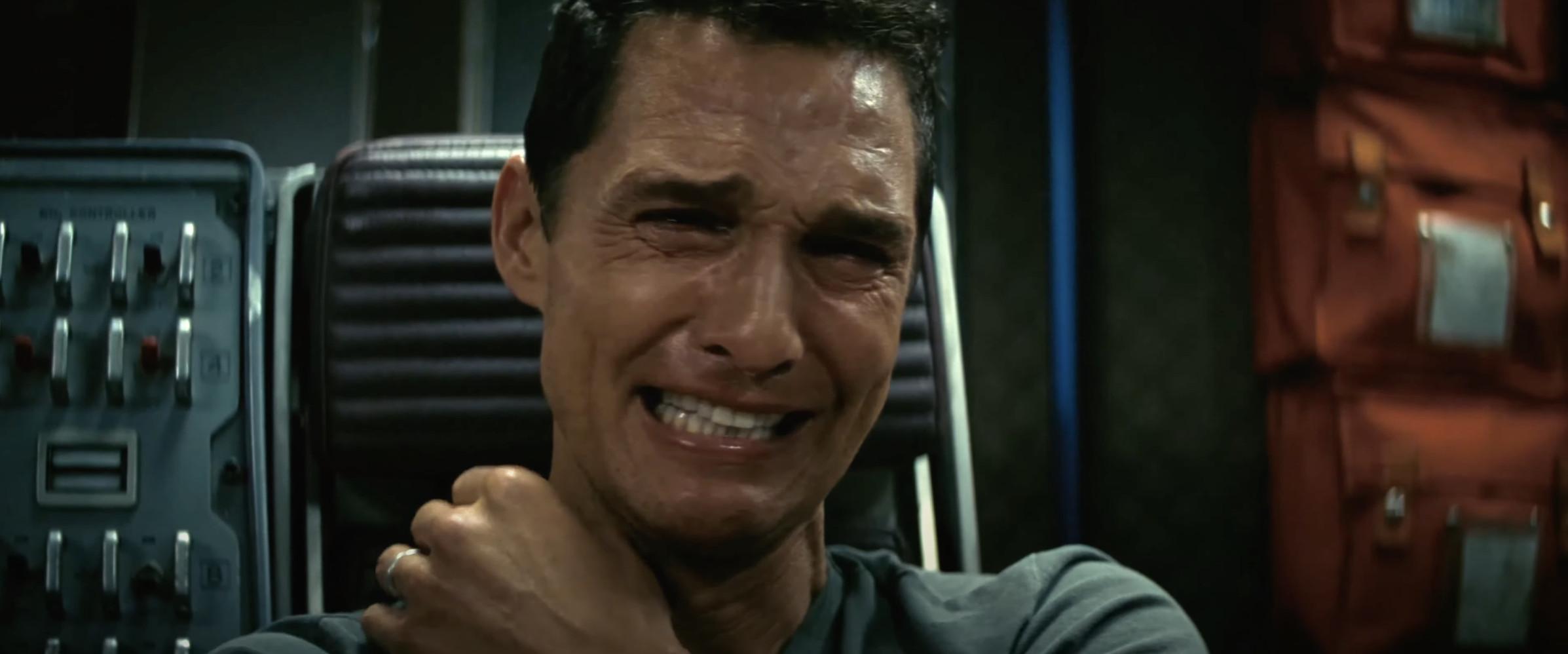
Click
When we think of Adam Sandler’s dramatic work, movies like Punch-Drunk Love, The Meyerowitz Stories, and Uncut Gems spring to mind. But I’m not sure any Sandler performance surprised me as much as Click. Sandwiched between lowbrow comedies like The Longest Yard and I Now Pronounce You Chuck & Larry, Click at first appears to be more of the same from Sandler, playing a man who attains a magical universal remote that allows him to pause, rewind, and fast-forward through events in his life. (Sandler’s Michael uses his new powers to fart in David Hasselhoff’s face, for instance.) But actions have consequences, and when Mike goes on an apathetic “autopilot” setting to skip through time, he misses the death of the family dog before blowing off his dad (Henry Winkler) in their final moments together. It’s devastating, and Sandler has rarely been better. Most importantly, when Henry Winkler is sad, we’re all sad with him.
The Guy Cry Meter: The hardest I’ve cried from a Black Mirror episode that wasn’t “San Junipero.”
Good Will Hunting
If you ever need proof that Bostonian men can get weepy, just put on Good Will Hunting. Written by and costarring two prodigal sons of Boston, Matt Damon and Ben Affleck, the film follows Will Hunting (Damon), a brash, combative genius who solves a complex mathematical equation while working as a janitor at MIT. Will’s brilliance catches the eye of Professor Gerald Lambeau (Stellan Skarsgard), who enlists his old college roommate, Sean Maguire (Robin Williams), to be Will’s therapist. Will and Sean are both battling demons: The former was abused as a child in the foster care system, while the latter is grieving the death of his wife (and, we later learn, also experienced childhood abuse). After several scenes of Will defiantly refusing to open up to Sean, you’re just waiting for the other shoe to drop. When Will finally lets his guard down and Sean reassures him that none of the abuse he experienced was his fault, you can feel the weight being lifted from Will’s shoulders in real time. A genius-level intellect isn’t required to deduce that this scene is a bona fide tearjerker.
The Guy Cry Meter: “It’s not your fault,” I repeatedly tell myself after breaking down in the middle of a Dunkin’ Donuts order while thinking about all the male role models in my life.
Braveheart
Mel Gibson is a solid litmus test for whether you can separate the art from the artist: He’s done a lot of deplorable things in his personal life, but I’ll begrudgingly admit that he can direct the hell out of a movie. (Don’t sleep on Apocalypto.) Gibson’s opus is still Braveheart, the ’90s historical epic based on the life of Scottish warrior William Wallace (Gibson). Wallace is put through the wringer in Braveheart, losing his father and true love before waging war with the English. But what really tugs at the heartstrings is how, when Wallace is publicly sentenced to death, he endures horrendous torture yet refuses to submit to the English crown. Wherever you stand on Braveheart and its many historical inaccuracies, Wallace’s final, defiant cries of “Freedom!” as he sees a vision of his beloved Murron (Catherine McCormack) in the crowd is powerful stuff. I’ll always loathe Gibson, but credit where it’s due: Braveheart is Guy Cry royalty.
The Guy Cry Meter: A solitary tear, and a lifelong hatred of the British Empire.
The Shawshank Redemption
The Shawshank Redemption has long been one of the highest-rated movies on IMDb, which means it gets plenty of pushback for being overrated. (It’s not even the best movie of 1994, if we’re being real.) But while The Shawshank Redemption shouldn’t be considered an all-time great, there’s a reason Frank Darabont’s film has fostered so much goodwill. Based on the Stephen King novella Rita Hayworth and Shawshank Redemption, the movie focuses on the decades-spanning friendship between Andy Dufresne (Tim Robbins), an innocent man convicted of killing his wife and her lover, and Ellis “Red” Redding (Morgan Freeman), a longtime inmate who runs point on all Shawshank State Prison contraband. Much of The Shawshank Redemption is tough to sit through, but that’s what makes Andy and Red’s bond all the richer—especially when they both get their happy ending. When it comes to cry-worthy moments, however, nothing will prepare you for the journey of Brooks Hatlen (James Whitmore), the prison’s elderly librarian who is paroled after 50 years and, unable to adjust to life on the outside, decides to hang himself. It’s a soul-crushing vignette that stays with you. Maybe IMDb is on to something after all.
The Guy Cry Meter: I spell out “Brooks was here” with all the discarded tissues I’ve used.
The Green Mile
We’re double-dipping in the extremely specific category of Darabont-directed King adaptations set in prison that were nominated for Best Picture, but how could we not? The Green Mile concerns John Coffey (Michael Clarke Duncan), a prisoner on death row who’s capable of miraculously healing anyone of their ailments, and the guard (Tom Hanks) who comes to believe that Coffey is an innocent man. To be clear, The Green Mile is not without issues: No less an authority than Spike Lee has criticized the film for embracing the tired Magical Negro trope. (This has been a recurring issue in King’s work.) But on an emotional level, it’s hard not to get caught up in the stories of the men on both sides of the prison bars, or in Duncan’s Oscar-nominated performance, which exudes such warmth and grace. When Coffey asks not to have a hood cover his face during his execution because he’s afraid of the dark? It still hits me like a ton of bricks.
The Guy Cry Meter: Full-on tears, and embracing a pacifist approach to mice. (Mr. Jingles forever.)
Frequency
Full disclosure: When I asked my dad whether he had any recommendations for the Guy Cry Canon, he brought up Frequency. I hadn’t seen Frequency before, and I say this with affection for both the film and my dad’s appreciation for it: This thing is bonkers. Frequency takes place across two timelines, as NYPD detective John Francis Sullivan (Jim Caviezel) operates an old ham radio that allows him to communicate with his father, firefighter Frank Sullivan (Dennis Quaid), before his death in 1969. Obviously, a man speaking with his dead dad is heavy stuff, and the dynamic between John and Frank is quite moving. But Frequency is also about the butterfly effect that results from John saving Frank from his own death, which inadvertently leads to a serial killer remaining active before the Sullivans work together to stop him in the past and present. (Try not to think about how these events would alter the course of human history, because Frequency sure doesn’t.) I’ll be honest, Frequency didn’t hit me in the feels as much as some other movies on this list. But the film means a lot to my dad, and the Guy Cry Canon is all about dudes showing their sensitive side. This one’s for you, Dad.
The Guy Cry Meter: Call your dad and tell him how much you love him because I’m pretty sure ham radio frequencies don’t actually travel through time.
The Iron Giant
Not traditional Guy Cry cinema, but The Iron Giant deserves a spot in the canon because it’s (a) one of the greatest animated films ever made and (b) arguably the best Superman story since the Christopher Reeve era. The Iron Giant hinges on the bond between 9-year-old Hogarth (voiced by Eli Marienthal) and the mysterious alien robot (Vin Diesel) that crash-lands off the coast of small-town Maine. There are so many things to love about The Iron Giant: Brad Bird’s dynamic direction, a beautiful combination of hand-drawn animation and CGI, a surprising amount of laxative-related humor, and Harry Connick Jr. as the voice of a man who was an entire generation’s first introduction to hipsters. But the honest-to-god MVP of this film is Diesel, whose monosyllabic grumbles evoke the feeling that the titular Giant has a real soul behind all that machinery. Whether you’re a kid being introduced to The Iron Giant by your dad or the other way around, there won’t be a dry eye in the house when the Giant sacrifices himself to save his friend. Before Diesel hit us with “I am Groot,” there was “... Superman.”
The Guy Cry Meter: “You stay, I go, no following” is what I tell my friends and family as I sob uncontrollably in the bathroom.
Terminator 2: Judgment Day
Let’s stick with soulful robots for the next entry and give James Cameron credit for pulling off an incredible 180 with Terminator 2: Judgment Day. In the original film, Arnold Schwarzenegger was terrifyingly convincing as a killing machine that would stop at nothing to eliminate its target. Fast-forward to T2, and Schwarzenegger is even better as the lethal guardian of young John Connor (Edward Furlong), who’s being hunted by the more technologically advanced T-1000 (Robert Patrick). The reveal that Schwarzenegger’s T-800 is actually the good guy—immediately followed by an all-time chase sequence—is Big Jim operating at the peak of his powers, but he’s also got a proven track record of emotionally destroying audiences. (See also: Titanic.) At the end of T2, the T-800 decides to sacrifice itself to prevent Skynet from existing in the future. The farewell between John and the T-800 hits harder knowing the robot has transcended his programming by truly bonding with his ward. “I know now why you cry” will, in fact, always make me cry on command.
The Guy Cry Meter: If anyone asks how I’m doing at the end of T2, I wipe away my tears and hit ’em with this:
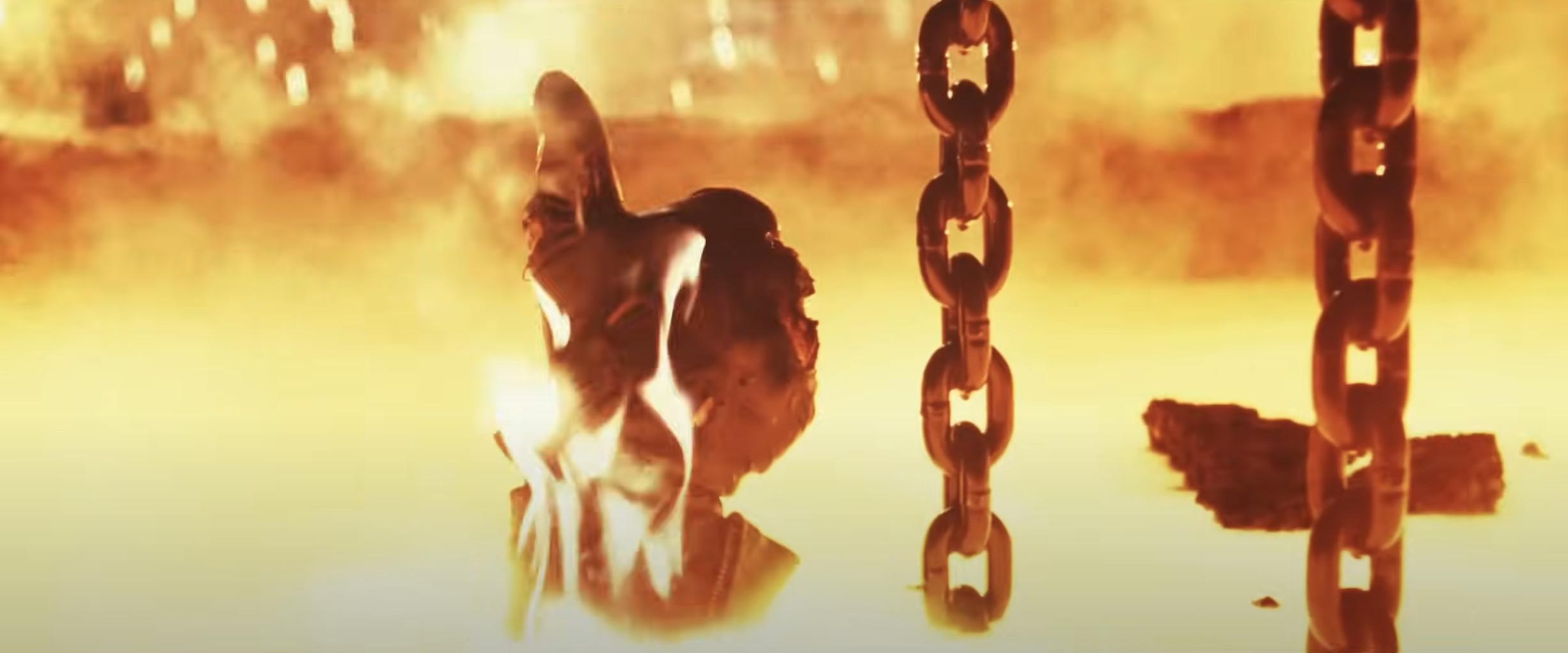
Boyz n the Hood
Whatever you were up to at 24, John Singleton had you beat. That’s how old the late, great filmmaker was when Boyz n the Hood, the coming-of-age drama inspired by Singleton’s upbringing in South Central Los Angeles, was nominated for Best Picture at the 64th Academy Awards. (Singleton also became the first Black man nominated for Best Director, as well as the youngest-ever nominee in the category, a record he still holds.) Following teenagers Tre (Cuba Gooding Jr.), Ricky (Morris Chestnut), and Doughboy (Ice Cube), Boyz n the Hood never shies away from the dangers its characters face in Crenshaw—the sense that death could loom around every corner, be it from gangs or the LAPD. But Singleton’s film is also tender and compassionate where it matters, particularly in the relationship between Tre and his father, Furious (Laurence Fishburne), who counsels his son even if Tre doesn’t always want to hear what he has to say. As for why Boyz n the Hood belongs in the Guy Cry Canon, well, I just have one word for you: RICKY!!!
The Guy Cry Meter: You think you’re done moping after Ricky dies, but then the movie’s postscript reveals that Doughboy was murdered two weeks later. It’s like Furious said: “They want us to kill ourselves.”
Field of Dreams
Field of Dreams is about a man who suffers a mental breakdown after hearing voices in his head that compel him to build a full-size baseball field on his Iowa farm, which is to say, this is a psychological thriller. All kidding aside, Field of Dreams is objectively strange for a film that became an American classic, but that’s part of its charm. Baseball is America’s pastime, and much of Field of Dreams is concerned with the past in ways both big (the 1919 Black Sox scandal) and small (Kevin Costner’s Ray Kinsella never reconciling with his late father) as ghosts from a bygone era of Major League Baseball manifest on that field. There are a few moments in Field of Dreams that threaten to leave viewers wiping away tears—“Hey, rookie … you were good”—but if you manage to hold it together to the very end, Ray’s game of catch with his dead dad will deliver the knockout punch.
The Guy Cry Meter: You’ll be compelled to play catch with the most important male figure in your life and use your glove as a handkerchief.
Saving Private Ryan
We’d long known that Steven Spielberg was a GOATed filmmaker by the time he got to Saving Private Ryan, but the R-rated war epic showed a different side of him. (For the longest stretch of pure horror in Spielberg’s career, just revisit the Omaha Beach sequence.) Like the finest war movies, Saving Private Ryan reels viewers in by exploring the camaraderie between its soldiers—tasked with rescuing a single man behind enemy lines—along with the understanding that not everyone will survive this mission. There are some harrowing deaths in Saving Private Ryan—I will never get over what happened to Adam Goldberg’s character—but nothing hits you quite like an elderly James Francis Ryan (Matt Damon) visiting the grave of the captain (Tom Hanks) who rescued him, hoping he redeemed the unit’s sacrifices by living a full life. Don’t take it from me: The true testament of Saving Private Ryan’s power is that its release opened a real-life dialogue between World War II veterans and the people closest to them.
The Guy Cry Meter: I wipe away a single tear as an American flag gently waves in the distance.
E.T. the Extra-Terrestrial
Another Spielberg joint. The Fabelmans might’ve been the closest thing to an autobiographical drama in his filmography, but E.T. the Extra-Terrestrial is the movie perhaps most inspired by his parents’ divorce. In other words, E.T. is a heavy watch for viewers of all ages, but rewarding all the same. The story of young Elliott Taylor (Henry Thomas) and the alien he befriends who’s trying to phone home, E.T. is a triumph on every level: The performances of the child actors are stellar across the board, John Williams’s soaring score lends so much weight to each scene, and E.T. himself was so convincing that a young Drew Barrymore believed he was real. E.T. sure felt real to me when he died due to being cut off from his species and, after miraculously coming back to life, bid farewell to Elliott with a touching reminder that they’ll always be connected. True story: I just rewatched this scene, and yes, I cried again.
The Guy Cry Meter: I shove an entire packet of Reese’s Pieces in my mouth to muffle my sobs.
I Am Legend
A year before Iron Man launched the Marvel Cinematic Universe, a movie about Will Smith and a German shepherd hanging out in postapocalyptic New York made more than half a billion dollars. I Am Legend’s success was a testament to Smith’s appeal at the peak of his stardom, but if we’re being honest, he was upstaged in the film by a very good dog. (A dog so good, in fact, that Smith tried to adopt her after filming.) Unfortunately, the dog, named Sam in the movie, is also why I Am Legend belongs in the Guy Cry Canon. After Sam rescues Smith’s Dr. Robert Neville from a pack of zombie dogs and is bitten by one, it’s only a matter of time before she turns. The final moments between man and best friend are so, so hard to watch—I can still remember the collective groan my theater let out when Sam is bitten, followed by all the sniffling when Neville is forced to put her down. Rest in power, Sam; shout-out to a true legend.
The Guy Cry Meter: Inconsolable, setting up a monthly donation to the ASPCA, hugging every German shepherd in sight.
Logan
Wolverine has been at the forefront of many X-Men movies, but none of them truly did the character justice until Logan. Billed as Hugh Jackman’s swan song, Logan is set in the near future following a cataclysmic event that wiped out nearly all mutants on Earth. Logan himself is close to death, but before he shuffles off this mortal coil, he helps a young mutant with powers similar to his, X-23 (Dafne Keen), escape sinister forces by crossing the border into Canada. (Unfortunately, Logan hits different during a Trump presidency.) Much of the emotional investment in Logan comes from the audience’s relationship to the character, and to Jackman, who had inhabited a raw physicality and weary pathos for so many years. By the time we get to Logan’s inevitably heroic death, it’s hard not to get choked up: Like Robert Downey Jr.’s Tony Stark in Avengers: Endgame, Jackman can finally rest. Unfortunately, like Downey, who was recast in the MCU as Doctor Doom, Jackman also ruined a good thing by returning for Deadpool & Wolverine, a creatively bankrupt enterprise that opens with an NSYNC dance number featuring Logan’s corpse.
The Guy Cry Meter: We’ve all been there:
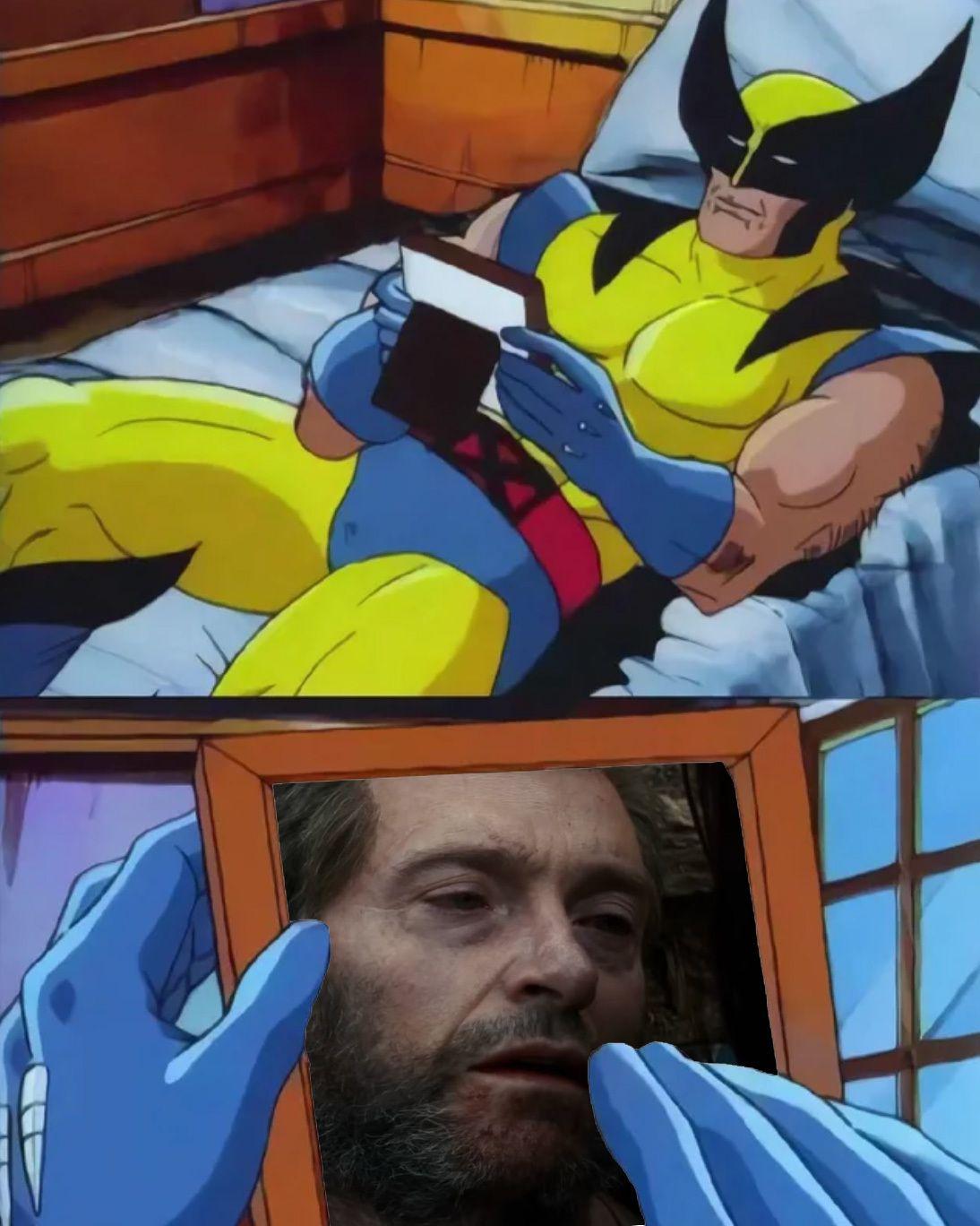
Warrior
Gavin O’Connor is a filmmaker who should be on more dudes’ radar. In addition to directing The Accountant—a perfect movie that, according to my calculations, airs on TNT several times a week—O’Connor is Hollywood’s reigning king of the sports movie, responsible for Miracle and The Way Back. His most underrated film, however, is Warrior: the grimy MMA drama in which estranged brothers Tommy and Brendan (Tom Hardy and Joel Edgerton) square off in the octagon. Men trading blows as a way of expressing their feelings is what you’re expecting going into Warrior, but what elevates the movie into a Guy Cry staple is Paddy (Nick Nolte), the brothers’ father and a recovering alcoholic who trains Tommy. The way the brothers interact with their dad tells you everything you need to know about how messed up their childhood was. (“So you found God, huh? That’s awesome. Mom kept calling out for him, but he wasn’t around.”) The verbal spats between Tommy and Paddy hit harder than any of Warrior’s punches—good luck trying to sit through Paddy’s relapse without getting choked up.
The Guy Cry Meter: I put on the extended version of the National’s “About Today” to drown out the sobbing in my bedroom, and then I hit the gym.
The Iron Claw
How bleak is the Von Erich history? In The Iron Claw, which covers the lives of the dynastic wrestling family, one of the Von Erich brothers who died was omitted from the movie because, unfortunately, there was more than enough misery to go around. In the film, brothers Kevin (Zac Efron), Kerry (Jeremy Allen White), David (Harris Dickinson), and Mike (Stanley Simons) constantly compete for their father’s affection in and outside the ring. Burdened by the weight of expectation and the belief that showing vulnerability is a sign of weakness, the Von Erich brothers die in tragic circumstances until Kevin is the only one left. It’s one emotional body blow after another, but The Iron Claw saves its most tear-jerking moment for last, when Kevin can’t hold back while watching his sons play catch. “I used to be a brother, and now I’m not a brother anymore,” he tells them. Consider my feelings suplexed.
The Guy Cry Meter: With tears streaming down my face, I choke slam every Academy voter I can find for failing to get Efron an Oscar nomination.
Gladiator
Last but not least, let’s bring it back to ancient Rome. Gladiator II has a lot to live up to, and not just because Russell Crowe might be Dad Cinema’s finest thespian. (Prove your valor, Paul Mescal.) The original Gladiator checks all the boxes for a crowd-pleasing historical epic: brutal fight sequences, political intrigue, compelling characters worth rooting for and against. But it’s Maximus’s vengeance for the death of his family that gives Gladiator its emotional weight, building to a tear-jerking climax in which our hero crosses over to the other side to see his wife and son again. Whether it’s your first time watching Gladiator or your 20th, you come away not just entertained: You’re moved. That’s the mark of a great movie—and first-ballot Guy Cry cinema.
The Guy Cry Meter: Did I manage to come away from my latest Gladiator rewatch keeping it together? For the answer, we turn to Commodus:
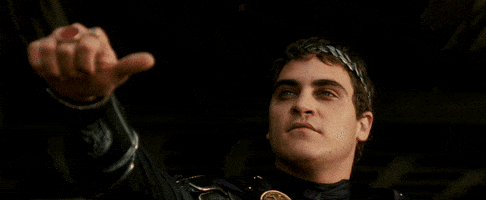
To my fellow Guy Criers, no need to be ashamed. Brothers, the tears we shed in life echo in eternity.
